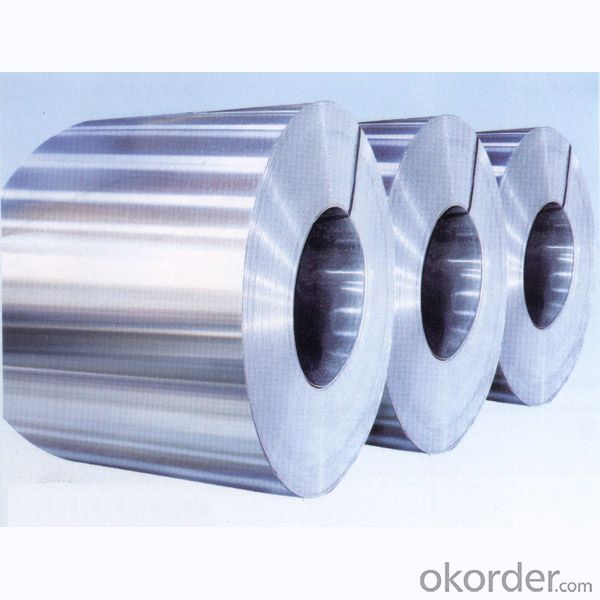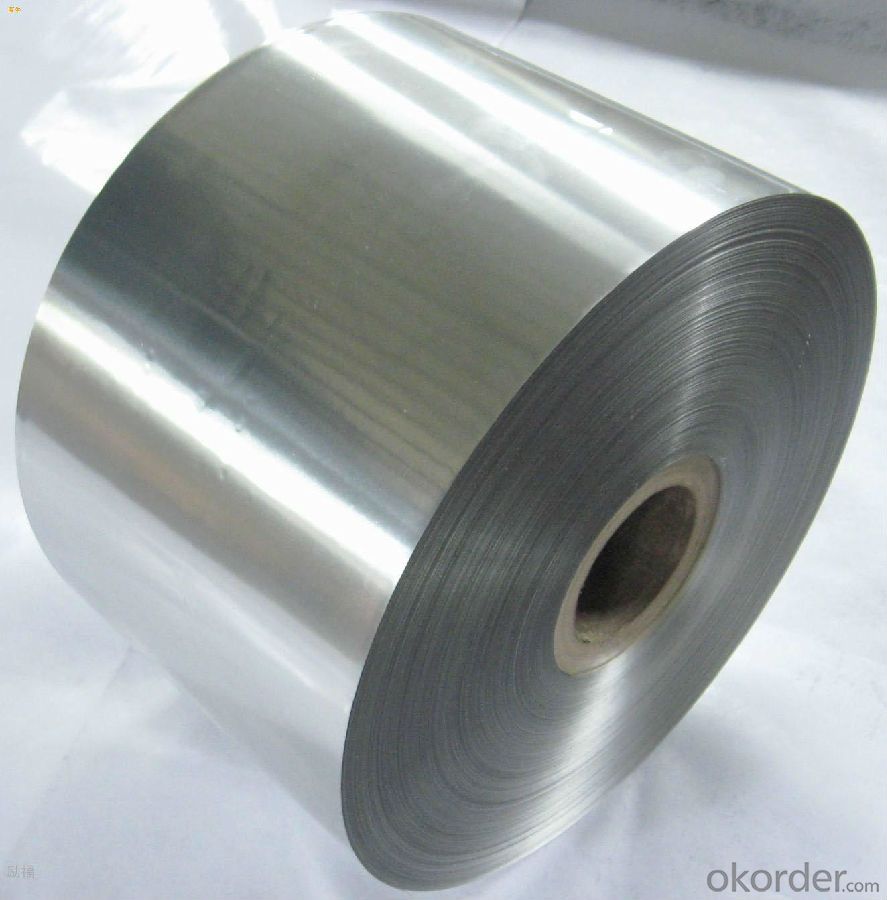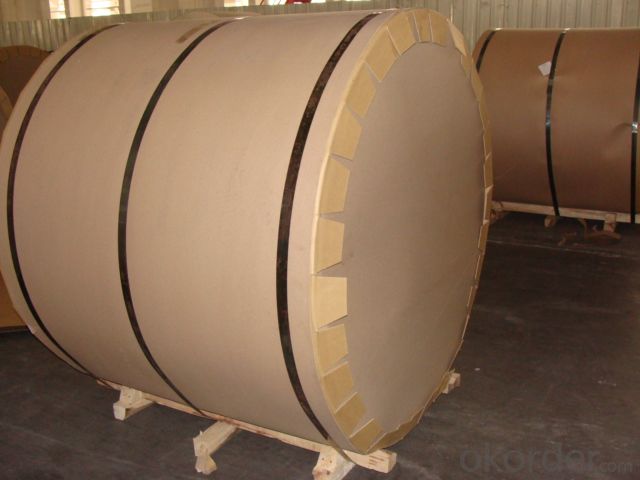AA3003 Aluminum Coils used for Construction
- Loading Port:
- Shanghai
- Payment Terms:
- TT OR LC
- Min Order Qty:
- 5 m.t.
- Supply Capability:
- 10000 m.t./month
OKorder Service Pledge
OKorder Financial Service
You Might Also Like
1.Structure of AA3003 Aluminum Coils used for Construction Description
AA3003 Aluminum Coils used for Construction has great ductility, heat conductivity, anti-corrosion and moisture resistance properties.
AA3003 Aluminum Coils used for Construction is widely used for PP cap stock, hot rolled thick plate, PS base plate, aluminum curtain wall base plate, the traffic sign ,air-conditioner heat and exchangers, food container, household foil, pharmaceutical packing, cigarettes packing.
2.Main Features of AA3003 Aluminum Coils used for Construction
• Superior quality of raw material
• Reasonable and stable chemical composition
• Accurate tolerance
• Goode mechanical property
3.AA3003 Aluminum Coils used for Construction Images



4.AA3003 Aluminum Coils used for Construction Specification
Alloy | A3003 |
Temper | H14, H16, H18, H22, H24, H26, H32, O/F |
Thickness | 0.2mm -- 100mm |
Width | 30mm -- 1700mm |
Standard | GB/T 3880-2006,EN |
5. FAQ of AA3003 Aluminum Coils used for Construction
A.How to guarantee the quality?
Customers are welcome to our mill to visit and check the products. Besides, we can arrange a third party to test AA3003 Aluminum Coils used for Construction.
B. Now which countries do you export your goods?
Now we export to South East Asia,Africa, North America,South America ect.
- Q:What are the common surface defects found in aluminum coils?
- Some common surface defects found in aluminum coils include: 1. Scratches: These are visible lines or marks on the surface of the coil that can be caused during handling, transportation, or processing. Scratches can impact the appearance and functionality of the aluminum coil. 2. Dents: Dents are depressions or deformations on the surface of the coil. They can occur due to mishandling or impact during transportation or storage. Dents can affect the structural integrity and aesthetics of the aluminum coil. 3. Corrosion: Aluminum is susceptible to corrosion, especially in environments with high levels of moisture or exposure to chemicals. Corrosion can appear as pitting, discoloration, or roughness on the surface of the coil. It can weaken the coil and compromise its performance. 4. Streaking: Streaks are thin lines or bands that appear on the surface of the coil, often caused by uneven coating or surface contamination. Streaking can affect the visual appeal of the aluminum coil and may indicate a problem with the manufacturing process. 5. Oxide spots: Oxide spots are small, discolored areas on the surface of the aluminum coil, caused by the formation of aluminum oxide. These spots can occur due to oxidation during processing or storage. While they do not typically affect the performance of the coil, they can be aesthetically undesirable. 6. Oil stains: Oil stains are greasy or oily marks on the surface of the aluminum coil, often caused by improper cleaning or handling. These stains can affect the adhesion of coatings or paints and may require additional cleaning or treatment. 7. Roll marks: Roll marks are elongated depressions or raised lines on the surface of the coil, caused by the rolling process during manufacturing. While roll marks are generally unavoidable, excessive or severe roll marks can impact the appearance and quality of the aluminum coil. It is important to note that proper quality control measures, handling, and storage practices can help minimize or prevent these surface defects in aluminum coils.
- Q:Can aluminum coils be recycled multiple times without losing their properties?
- Yes, aluminum coils can be recycled multiple times without losing their properties. Aluminum is a highly recyclable material and can be melted down and reused indefinitely without any significant degradation in its properties. This makes aluminum coils a sustainable and environmentally friendly choice for various applications.
- Q:What is the maximum temperature resistance of aluminum coils?
- Various factors, including alloy composition, purity, and specific application, determine the maximum temperature resistance of aluminum coils. Generally, aluminum has a low melting point of approximately 660 degrees Celsius (1220 degrees Fahrenheit). As a result, the temperature resistance of aluminum coils typically falls between 200 and 400 degrees Celsius (392 to 752 degrees Fahrenheit). Exceeding these temperatures may lead to structural alterations in aluminum, such as softening or deformation, which could affect its performance and integrity. Consequently, it is crucial to consider the specific demands and limitations of the application when determining the maximum temperature resistance of aluminum coils.
- Q:What is the shear strength of aluminum coils?
- The shear strength of aluminum coils varies depending on the specific alloy and temper. However, on average, aluminum coils have a shear strength ranging from 110 MPa to 190 MPa.
- Q:Can aluminum coils be painted for custom designs?
- Yes, aluminum coils can be painted for custom designs. Aluminum is a versatile material that can be coated with various paints and finishes, allowing for a wide range of custom design options.
- Q:Can aluminum coils be used in wastewater treatment plants?
- Yes, aluminum coils can be used in wastewater treatment plants. Aluminum coils are commonly used in the construction of heat exchangers, which are essential components in wastewater treatment plants. Heat exchangers are used to transfer heat from the wastewater to the treatment process, helping to optimize the treatment efficiency and reduce energy consumption. Aluminum coils are preferred in some cases due to their excellent thermal conductivity, lightweight, and resistance to corrosion, making them suitable for the harsh environment of wastewater treatment plants. Additionally, aluminum coils are cost-effective and have a long lifespan, making them a reliable choice for use in wastewater treatment facilities.
- Q:Can aluminum coils be used for food storage and processing?
- Yes, aluminum coils can be used for food storage and processing. Aluminum is a popular choice for food storage and processing due to its many beneficial properties. It is lightweight, strong, and resistant to corrosion, which makes it ideal for maintaining the quality and freshness of food. Aluminum coils can be used to manufacture various food storage and processing equipment such as containers, pans, trays, and foil. Additionally, aluminum has excellent thermal conductivity, which allows for efficient cooling and heating of food. It is also impermeable to light, moisture, and oxygen, which helps to protect food from spoilage and contamination. Overall, aluminum coils are a reliable and safe option for food storage and processing applications.
- Q:What are the different types of aluminum coils?
- There are several different types of aluminum coils, including plain aluminum coils, painted aluminum coils, embossed aluminum coils, and coated aluminum coils. Each type has specific properties and uses, making them suitable for different applications in various industries.
- Q:Are aluminum coils suitable for electrical conductors?
- Yes, aluminum coils are suitable for electrical conductors. Aluminum is a widely used material in the electrical industry due to its excellent electrical conductivity. It has around 61% conductivity of copper, which is the most commonly used metal for electrical conductors. Aluminum coils are lightweight, cost-effective, and have good thermal conductivity, making them a popular choice for various electrical applications. However, it is important to note that aluminum has a lower tensile strength compared to copper, so it may require a larger cross-sectional area to achieve the same level of current carrying capacity. Additionally, proper insulation and connectors are necessary to prevent oxidation and ensure efficient electrical conductivity in aluminum coils.
- Q:What are the different joining methods for aluminum coils?
- Some of the different joining methods for aluminum coils include welding, soldering, brazing, and mechanical fastening.
1. Manufacturer Overview |
|
|---|---|
| Location | |
| Year Established | |
| Annual Output Value | |
| Main Markets | |
| Company Certifications | |
2. Manufacturer Certificates |
|
|---|---|
| a) Certification Name | |
| Range | |
| Reference | |
| Validity Period | |
3. Manufacturer Capability |
|
|---|---|
| a)Trade Capacity | |
| Nearest Port | |
| Export Percentage | |
| No.of Employees in Trade Department | |
| Language Spoken: | |
| b)Factory Information | |
| Factory Size: | |
| No. of Production Lines | |
| Contract Manufacturing | |
| Product Price Range | |
Send your message to us
AA3003 Aluminum Coils used for Construction
- Loading Port:
- Shanghai
- Payment Terms:
- TT OR LC
- Min Order Qty:
- 5 m.t.
- Supply Capability:
- 10000 m.t./month
OKorder Service Pledge
OKorder Financial Service
Similar products
New products
Hot products
Related keywords





























